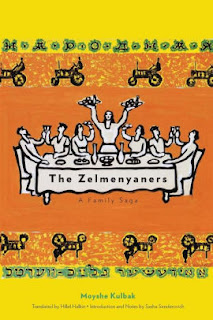The Zelmenyaners
 The Zelmenyaners, by Moyshe Kulbak
The Zelmenyaners, by Moyshe KulbakA couple of years ago, I read Outwitting History, about saving Yiddish literature from the dumpster of history. IT was one of my favorite books of the year, and it put some Yiddish titles on my wishlist. This was one of them, and I finally picked it up!
The Zelmenyaners appeared in a serial format in a Yiddish monthly magazine called Shtern (the Star), published in the Soviet Union. It was actually two series; the first one ran in 1929 - 1930, and the second 1933 - 1935. It became a comic family saga, about a Jewish family in Minsk.
None of the Zelmanyaners are actually named that. Their father, Reb Zelmele, has been dead for a while now, but it's still his courtyard, with his descendants all living around in a big house, and little houses, and stables. Bubbe Bashe is their matriarch, and she's so old she's like a little hen. The four sons now have children and grandchildren, and so there are Zelmenyaners all over the place, all a bit alike. And this is their story, which goes on as the USSR gets more powerful, and it shoves even those Zelmenyaners around.
The first series of stories is funnier than the second, but it's all interesting and enjoyable. My favorite was probably Uncle Itshe, because
Apart from his family traits, Uncle Itshe has one all his own. He sneezes like an explosion. Once a sneeze of his caused a neighbor to faint.Me too, Uncle Itshe. Me too. Also he's a tailor, so he sews and sneezes, just like me. Much later on, he has to give up being an independent and go to sew in a factory -- who ever heard of a factory of tailors?
In the days of the Civil War, Uncle Itshe's sneezing was unnerving....
There are all sorts of stories in this satirical story of Jewish Soviet life. Great stuff, I wish it was better known. Hooray for the Yiddish Book Center, and the folks who saved these books!
___________
The cover has words in Russian and Hebrew. I can't read the Hebrew, but the Russian says народная, people. As in, those are the people's tractors! If you can read the Hebrew, please comment and tell me what it says.




Comments
Post a Comment
I'd love to know what you think, so please comment!